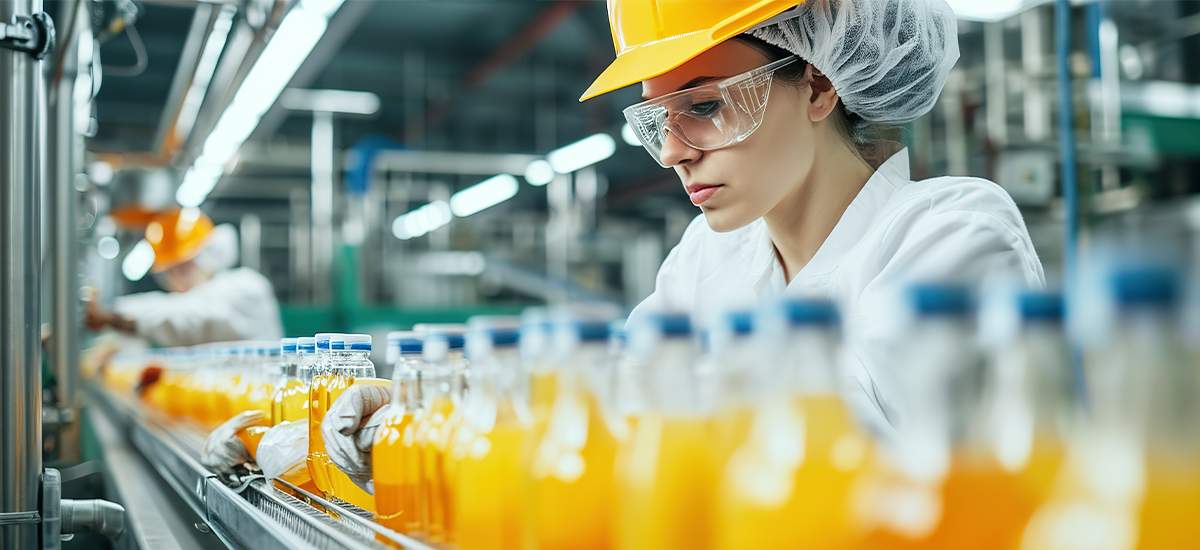
Listen to this blog
In the dynamic landscape of the food and beverage industry, manufacturers face multifaceted challenges, from stringent regulatory requirements to intricate food supply chain management complexities. To navigate these hurdles and maintain a competitive edge, many are turning to Food and Beverage ERP systems. These integrated software solutions streamline operations, enhance efficiency, and ensure compliance, thereby optimizing processes across the board.
The imperative for food and beverage ERP systems in the industry
The food and beverage sector operates under unique pressures, including perishable inventory, fluctuating consumer demands, and rigorous safety standards. Food and beverage ERP systems address these challenges by integrating various business processes into a unified platform, offering real-time data and insights that are crucial for informed decision-making. This integration not only enhances operational efficiency but also ensures that all departments—from procurement to distribution—are aligned and functioning cohesively.
Key benefits of implementing food and beverage ERP systems
Streamlined operations
Food and Beverage ERP systems consolidate disparate functions such as procurement, production, inventory management, and distribution into a single cohesive system. This integration facilitates seamless communication between departments, reduces manual data entry, and minimizes errors. The result is enhanced operational efficiency, allowing manufacturers to respond swiftly to market changes and reduce operational costs.
Enhanced food supply chain management
Effective food supply chain management is vital in the food and beverage industry due to product perishability. Food and Beverage ERP systems enable real-time tracking of stock levels, expiration dates, and batches, optimizing inventory, reducing waste, and ensuring timely deliveries. They also enhance supplier management with tools for procurement planning, vendor evaluation, and order tracking.
Regulatory compliance and food safety
Manufacturers face strict food safety regulations, making compliance essential. Food and beverage ERP systems ensure adherence to standards like HACCP, FDA, and ISO by enabling traceability from raw materials to finished products. They also manage quality control, automate compliance reporting, and maintain detailed audit records, ensuring quick issue resolution and regulatory compliance.
Improved production planning and scheduling
Efficient production planning is crucial for meeting demand and reducing waste. Food and beverage ERP systems optimize manufacturing by integrating demand forecasts, production capacity, and material availability into smart scheduling tools. This improves efficiency, minimizes lead times, lowers costs, and enhances product quality, ensuring a streamlined and cost-effective production process.
Data-driven decision making
Food and Beverage ERP systems provide real-time data across the organization, helping manufacturers analyze sales performance, production efficiency, and food supply chain management dynamics. With advanced analytics and reporting tools, businesses can make informed decisions, identify growth opportunities, and adapt to market trends, ensuring continuous improvement and a competitive edge.
Latest trends in food and beverage ERP systems
As technology continues to evolve, food and beverage ERP systems are incorporating advanced features to meet the specific needs of the food and beverage industry. Notable trends include:
Integration of artificial intelligence (AI) and Machine Learning (ML)
Modern Food and Beverage ERP systems integrate AI and ML for predictive analytics, demand forecasting, and anomaly detection. These technologies help manufacturers anticipate trends, optimize inventory, and prevent disruptions. As AI evolves, it continues to transform business processes and enhance operational efficiency across the food and beverage industry.
Adoption of cloud-based solutions
The shift towards cloud-based food and beverage ERP solutions provides manufacturers with greater scalability, flexibility, and cost efficiency. With real-time data accessibility from any location, these systems enable seamless remote work and collaboration. As adoption continues to rise, cloud ERP is becoming an essential tool for businesses seeking to enhance operational agility and streamline resource management.
Emphasis on sustainability and traceability
Consumers increasingly demand transparency and traceability in the food and beverage industry. Food and Beverage ERP solutions track ingredient origins, ensuring food safety and aligning with evolving expectations. As sustainability and traceability become priorities, ERP adoption grows, reinforcing its role in maintaining industry standards and enhancing operational efficiency.
Mobile accessibility
Food and beverage ERP vendors are developing mobile applications to provide users with on-the-go access to critical information, enhancing responsiveness and decision-making capabilities. This trend aligns with the industry's need for real-time data access, especially for field operations and remote management.
Selecting the right food and beverage ERP system in 2025
Selecting an food and beverage ERP system that aligns with your business needs is essential. Look for industry-specific functionality like lot tracking and compliance management. Ensure scalability to support growth and user-friendliness for easier adoption. Vendor support is crucial for long-term success. Leading food and beverage ERP solutions for the food and beverage industry in 2025 include SAP S/4 HANA, Oracle Cloud ERP, and Microsoft Dynamics 365, each offering distinct advantages for businesses of different sizes and requirements.
Conclusion
Implementing a food and beverage ERP system helps manufacturers optimize processes, ensure compliance, and stay competitive. By leveraging the latest technology and scalable solutions, businesses can enhance efficiency, streamline operations, and drive growth. Exploring food consulting services further aids in ERP implementation and operational optimization.
FAQs:
1. What is food and beverage ERP solution and software?
A Food and beverage ERP solution is specialized software that integrates key processes like inventory management, supply chain operations, compliance tracking, and production planning to enhance efficiency and ensure food safety. It enables real-time data access, regulatory compliance, and optimized workflows, helping manufacturers streamline operations and scale effectively.
2. Why do you need food and beverage ERP Software?
A Food and beverage ERP system streamlines operations, ensures compliance, optimizes inventory, and enhances supply chain efficiency. It enables real-time tracking, production planning, and cost control, reducing waste and improving decision-making, making it essential for long-term success in the food and beverage industry.
3. What are food consulting services?
Food consulting services help food and beverage businesses enhance operations, ensure compliance, improve food safety, and optimize supply chains. They also assist with ERP implementation, quality control, and process efficiency, enabling businesses to stay competitive and achieve sustainable growth.




